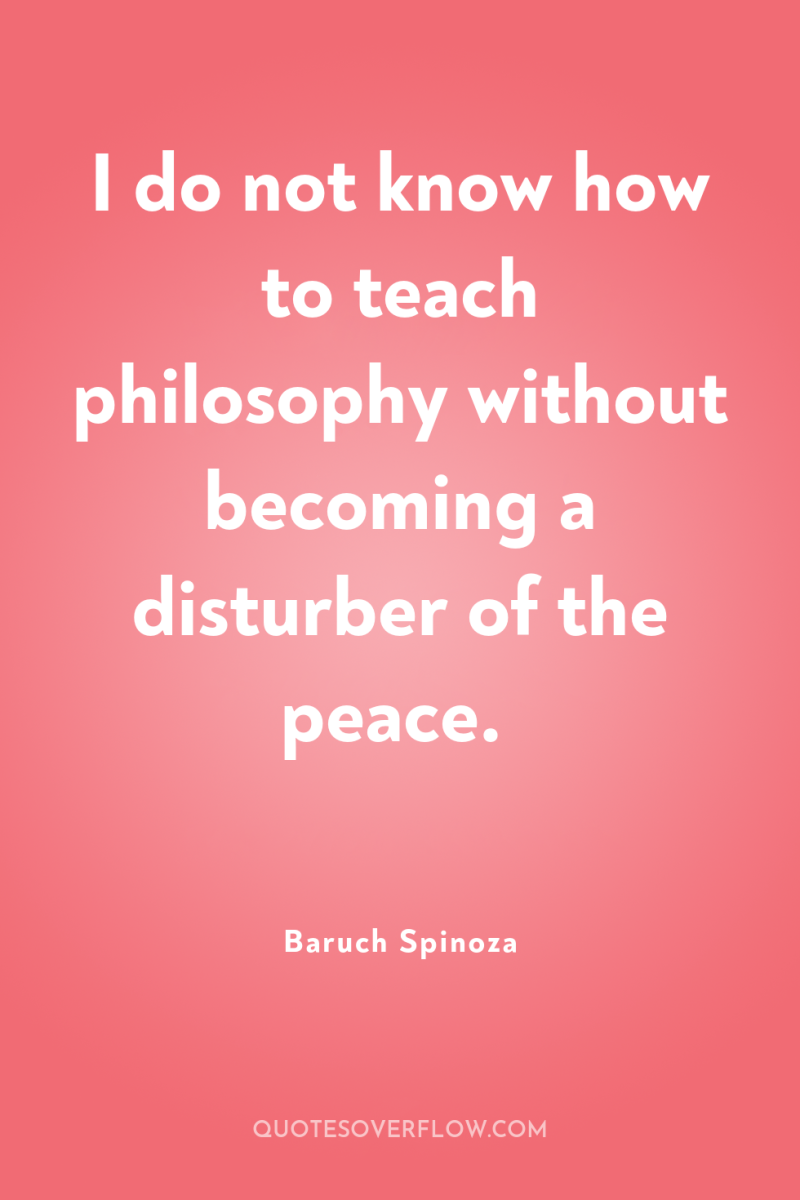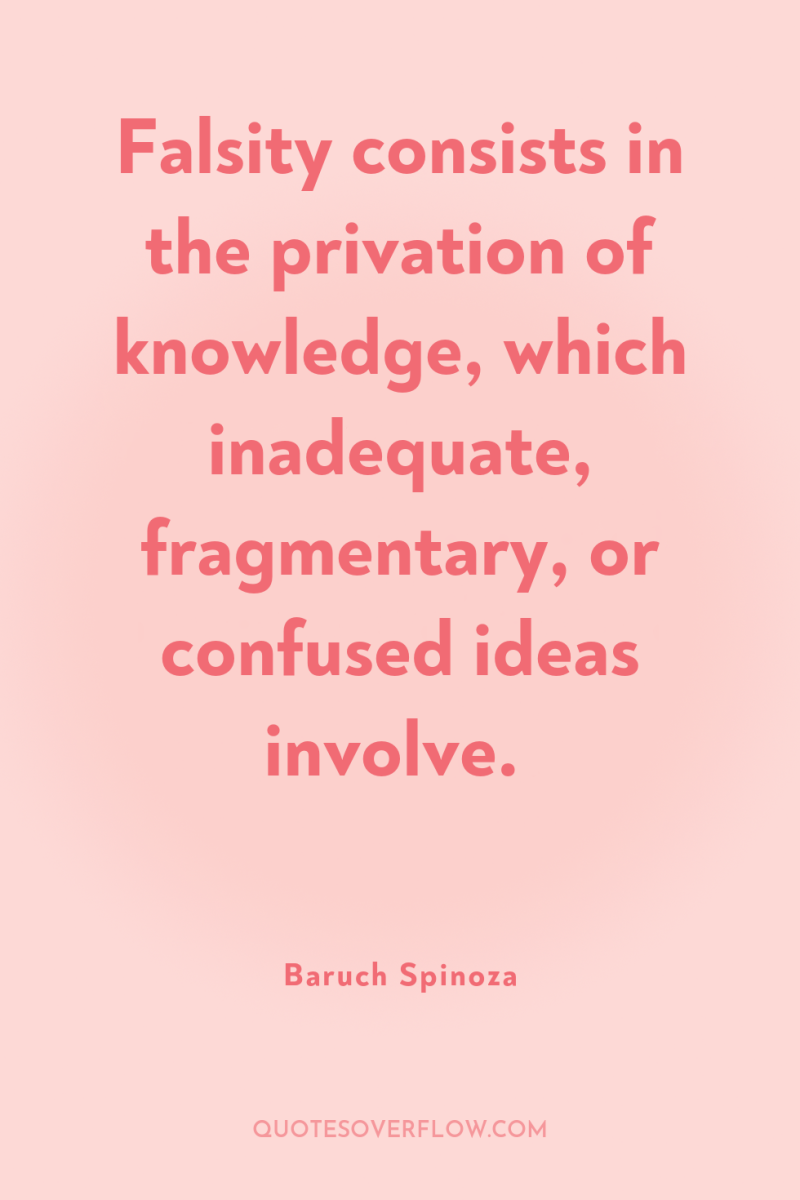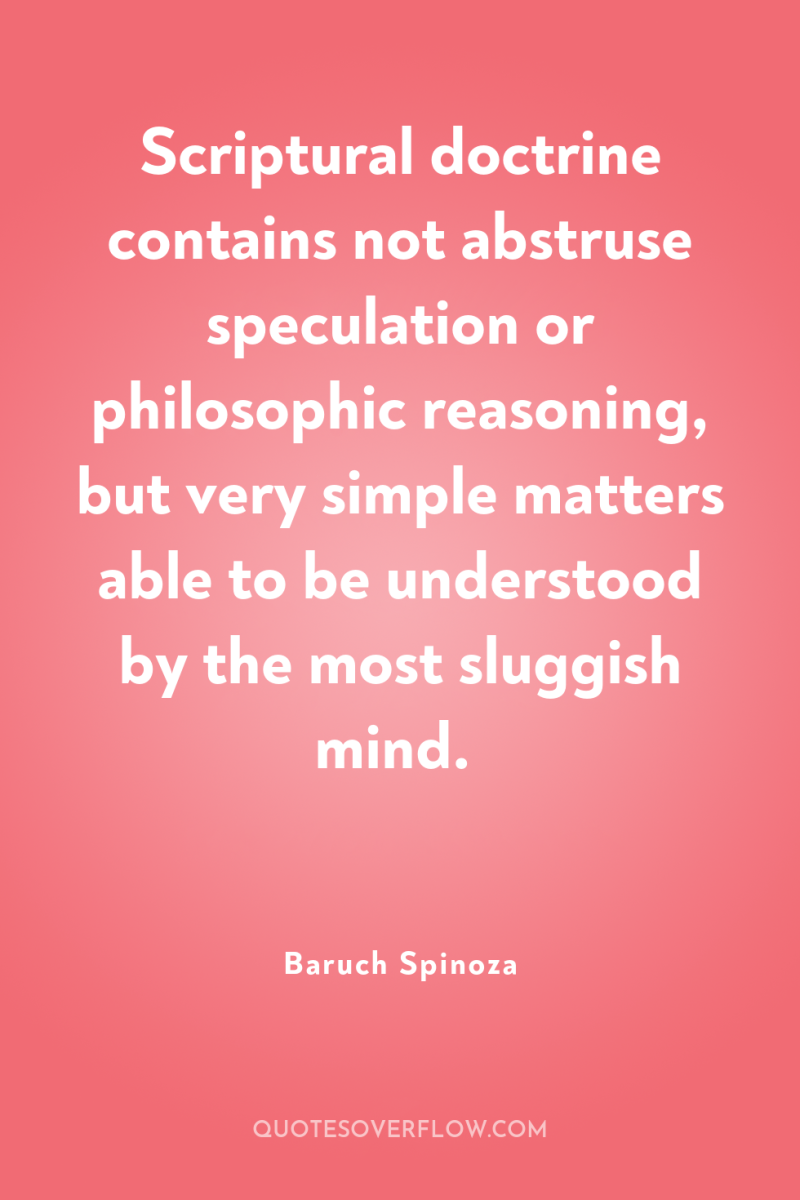
1
The highest activity a human being can attain is learning for understanding, because to understand is to be free.Baruch Spinoza

2
I do not know how to teach philosophy without becoming a disturber of the peace.Baruch Spinoza

3
I have made a ceaseless effort not to ridicule, not to bewail, not to scorn human actions, but to understand them.Baruch Spinoza
4
The more you struggle to live, the less you live. Give up the notion that you must be sure of what you are doing. Instead, surrender to what is real within you, for that alone is sure....you are above everything distressing.Baruch Spinoza
5
Minds, however, are conquered not by arms, but by love and nobility.Baruch Spinoza

6
He alone is free who lives with free consent under the entire guidance of reasonBaruch Spinoza

7
Whatsoever is, is in God, and without God nothing can be, or be conceivedBaruch Spinoza

8
The good which every man, who follows after virtue, desires for himself he will also desire for other men...Baruch Spinoza
9
I should attempt to treat human vice and folly geometrically... the passions of hatred, anger, envy, and so on, considered in themselves, follow from the necessity and efficacy of nature... I shall, therefore, treat the nature and strength of the emotion in exactly the same manner, as though I were concerned with lines, planes, and solids.Baruch Spinoza

10
Things which are accidentally the causes either of hope or fear are called good or evil omens.Baruch Spinoza
11
Aquele que quer responder às injúrias com o ódio vive na tristeza ou na mágoa, aquele que quer vencer o ódio com o amor combate alegremente e sem temor. Triunfa tanto sobre um grande número de inimigos quanto sobre um único, prescindindo de todo socorro da fortuna. Aqueles a quem ele consegue vencer ficam alegres por terem sido derrotados; e, derrotados, eles não são menos fortes; ao contrário, são mais fortes.Baruch Spinoza
12
Of all the things that are beyond my power, I value nothing more highly than to be allowed the honor of entering into bonds of friendship with people who sincerely love truth. For, of things beyond our power, I believe there is nothing in the world which we can love with tranquility except such men.Baruch Spinoza
13
Those who wish to seek out the cause of miracles and to understand the things of nature as philosophers, and not to stare at them in astonishment like fools, are soon considered heretical and impious, and proclaimed as such by those whom the mob adores as the interpreters of nature and the gods. For these men know that, once ignorance is put aside, that wonderment would be taken away, which is the only means by which their authority is preserved.Baruch Spinoza
14
Don’t cry and don’t rage. Understand.Baruch Spinoza

15
Emotion, which is suffering, ceases to be suffering as soon as we form a clear and precise picture of it.Baruch Spinoza
![Every person should embrace those [dogmas] that he, being the...](https://cdn.quotesoverflow.com/file/quotesoverflow/images/every-person-should-embrace-those-dogmas353478515691-1200.webp)
16
Every person should embrace those [dogmas] that he, being the best judge of himself, feels will do most to strengthen in him love of justice.Baruch Spinoza
17
He who, while unacquainted with these writings, nevertheless knows by the natural light that there is a God having the attributes we have recounted, and who also pursues a true way of life, is altogether blessed.Baruch Spinoza

18
Falsity consists in the privation of knowledge, which inadequate, fragmentary, or confused ideas involve.Baruch Spinoza

19
The purpose of the state is really freedom.Baruch Spinoza

20
Scriptural doctrine contains not abstruse speculation or philosophic reasoning, but very simple matters able to be understood by the most sluggish mind.Baruch Spinoza
21
It will be said that, although God’s law is inscribed in our hearts, Scripture is nevertheless the Word of God, and it is no more permissible to say of Scripture that it is mutilated and contaminated than to say this of God’s Word. In reply, I have to say that such objectors are carrying their piety too far, and are turning religion into superstition; indeed, instead of God’s Word they are beginning to worship likenesses and images, that is, paper and ink.Baruch Spinoza

22
If Scripture were to describe the downfall of an empire in the style adopted by political historians, the common people would not be stirred.Baruch Spinoza
23
Everyone is by absolute natural right the master of his own thoughts, and thus utter failure will attend any attempt in a commonwealth to force men to speak only as prescribed by the sovereign despite their different and opposing opinions.Baruch Spinoza
24
Most of those who have written about the Affects, and men’s way of living, seem to treat, not of natural things, which follow the common laws of nature, but of things that are outside nature. Indeed they seem to conceive man in nature as a dominion within a dominion. For they believe that man disturbs, rather than follows, the order of nature, that he has absolute power over his actions, and that he is determined only by himself.Baruch Spinoza
25
I shall treat the nature and power of the Affects, and the power of the Mind over them, by the same Method by which, in the preceding parts, I treated God and the Mind, and I shall consider human actions and appetites just as if it were a Question of lines, planes, and bodies.Baruch Spinoza
26
Those who know the true use of money, and regulate the measure of wealth according to their needs, live contented with few things.Baruch Spinoza
27
He who has a true idea simultaneously knows that he has a true idea, and cannot doubt of the truth of the thing perceived.Baruch Spinoza
28
The order and connection of ideas in the same as the order and connection of thingsBaruch Spinoza
29
The object of the idea constituting the human mind is the bodyBaruch Spinoza
30
I saw that all the things I feared and which feared me had nothing good or bad in them save in so far as the mind was affected by them.Baruch Spinoza
31
After experience had taught me that all the usual surroundings of social life are vain and futile; seeing that none of the objects of my fears contained in themselves anything either good or bad, except in so far as the mind is affected by them, I finally resolved to inquire whether there might be some real good having power to communicate itself, which would affect the mind singly, to the exclusion of all else: whether, in fact, there might be anything of which the discovery and attainment would enable me to enjoy continuous, supreme, and unending happiness.Baruch Spinoza
32
The formation of society serves not only for defensive purposes, but is also very useful, and, indeed, absolutely necessary, as rendering possible the division of labor. If men did not render mutual assistance to each other, no one would have either the skill or the time to provide for his own sustenance and preservation: for all men are not equally apt for all work, and no one would be capable of preparing all that he individually stood in need of. Strength and time, I repeat, would fail, if every one had in person to plow, to sow, to reap, to grind corn, to cook, to weave, to stitch and perform the other numerous functions required to keep life going; to say nothing of the arts and sciences which are also entirely necessary to the perfection and blessedness of human nature.Baruch Spinoza
33
For though men be ignorant, yet they are menBaruch Spinoza
34
Most errors consist only in our not rightly applying names to things. For when someone says that the lines which are drawn from the center of a circle to its circumference are unequal, he surely understands (then at least) by a circle something different from what mathematicians understand. Similarly, when men err in calculating they have certain numbers in their mind and different ones on the paper. So if you consider what they have in mind, they really do not err, though they seem to err because we think they have in their mind the numbers which are on the paper. If this were not so, we would not believe that they were erring, just as I did not believe that he was erring whom I recently heard cry out that his courtyard had flown into his neighbor's hen, because what he had in mind seemed sufficiently clear to me. And most controversies have arisen from this, that men do not rightly explain their own mind, or interpret the mind of the other man badly. For really, when they contradict one another most vehemently, they either have the same thoughts, or they are thinking of different things, so that what they think are errors and absurdities in the other are not. .Baruch Spinoza
35
Hatred is increased by being reciprocated, and can on the other hand be destroyed by love.Baruch Spinoza
36
All laws which can be violated without doing any one any injury are laughed at. Nay, so far are they from doing anything to control the desires and passions of men that, on the contrary, they direct and incite men's thoughts the more toward those very objects, for we always strive toward what is forbidden and desire the things we are not allowed to have. And men of leisure are never deficient in the ingenuity needed to enable them to outwit laws framed to regulate things which cannot be entirely forbidden.. He who tries to determine everything by law will foment crime rather than lessen it. .Baruch Spinoza
37
It is the part of a wise man, I say, to refresh and restore himself in moderation with pleasant food and drink, with scents, with the beauty of green plants, with decoration, music, sports, the theater, and other things of this kind, which anyone can use without injury to another.Baruch Spinoza
38
The ultimate aim of government is not to rule, or restrain by fear, nor to exact obedience, but to free every man from fear that he may live in all possible security... In fact the true aim of government is liberty.Baruch Spinoza
39
When a man is prey to his emotions, he is not his own master.Baruch Spinoza
40
Such things as are good simply because they have been commanded or instituted, or as being symbols of something good, are mere shadows which cannot be reckoned among actions that are the offspring, as it were, or fruit of a sound mind and of intellect.Baruch Spinoza
41
I call him free who is led solely by reason.Baruch Spinoza
42
In proportion as we endeavor to live according to the guidance of reason, shall we strive as much as possible to depend less on hope, to liberate ourselves from fear, to rule fortune, and to direct our actions by the sure counsels of reason.Baruch Spinoza
43
Even more, in the created thing, is a perfection that she exists; since the greatest of all imperfections is, not to exist.Baruch Spinoza
44
The more clearly you understand yourself and your emotions, the more you become a lover of what is.Baruch Spinoza
45
Nothing forbids man to enjoy himself, save grim and gloomy superstitionBaruch Spinoza
46
Men, in so far as they live in obedience to reason necessarily do only such things as are necessarily good for human nature, and consequently for each individual man.Baruch Spinoza
47
Those, who are believed to be most self–abased and humble, are generally in reality the most ambitious and enviousBaruch Spinoza
48
The superstitious know how to reproach people for their vices better than they know how to teach them virtues, and they strive, not to guide men by reason, but to restrain them by fear, so that they flee the evil rather than love virtues. Such people aim only to make others as wretched as they themselves are, so it is no wonder that they are generally burdensome and hateful to men.Baruch Spinoza
49
Blessedness is not the reward of virtue, but virtue itself.Baruch Spinoza
50
I do not know how to teach philosophy without becoming a disturber of established religion.Baruch Spinoza
51
Everyone endeavors as much as possible to make others love what he loves, and to hate what he hates... This effort to make everyone approve what we love or hate is in truth ambition, and so we see that each person by nature desires that other persons should live according to his way of thinking...Baruch Spinoza
52
In so far as the mind sees things in their eternal aspect, it participates in eternity.Baruch Spinoza
53
Self-preservation is the primary and only foundation of virtue.Baruch Spinoza
54
Do not weep do not wax indignant. Understand.Baruch Spinoza
55
Faith is nothing but obedience and piety.Baruch Spinoza
56
To be what we are and to become what we are capable of becoming is the only end of life.Baruch Spinoza
57
There is no hope unmingled with fear and no fear unmingled with hope.Baruch Spinoza
58
We can always get along better by reason and love of truth than by worry of conscience and remorse. Harmful are these and evil.Baruch Spinoza
59
There is no hope unmingled with fear, and no fear unmingled with hope.Baruch Spinoza
60
Fear cannot be without hope nor hope without fear.Baruch Spinoza
61
Peace is not an absence of war, it is a virtue, a state of mind, a disposition for benevolence, confidence, justice.Baruch Spinoza
62
For peace is not mere absence of war, but is a virtue that springs from, a state of mind, a disposition for benevolence, confidence, justice.Baruch Spinoza
63
I would warn you that I do not attribute to nature either beauty or deformity, order or confusion. Only in relation to our imagination can things be called beautiful or ugly, well-ordered or confused.Baruch Spinoza
64
Only that thing is free which exists by the necessities of its own nature, and is determined in its actions by itself alone.Baruch Spinoza
65
Freedom is absolutely necessary for the progress in science and the liberal arts.Baruch Spinoza
66
Peace is not the absence of war, but a virtue based on strength of character.Baruch Spinoza
67
One and the same thing can at the same time be good, bad, and indifferent, e.g., music is good to the melancholy, bad to those who mourn, and neither good nor bad to the deaf.Baruch Spinoza
68
All happiness or unhappiness solely depends upon the quality of the object to which we are attached by love.Baruch Spinoza
69
Happiness is a virtue, not its reward.Baruch Spinoza
70
To give aid to every poor man is far beyond the reach and power of every man. Care of the poor is incumbent on society as a whole.Baruch Spinoza
71
Ambition is the immoderate desire for power.Baruch Spinoza
72
God is the indwelling and not the transient cause of all things.Baruch Spinoza
73
Whatsoever is, is in God, and without God nothing can be, or be conceived.Baruch Spinoza
74
Those who are believed to be most abject and humble are usually most ambitious and envious.Baruch Spinoza
75
It may easily come to pass that a vain man may become proud and imagine himself pleasing to all when he is in reality a universal nuisance.Baruch Spinoza
76
Do not weep do not wax indignant. Understand.Baruch Spinoza
77
The world would be happier if men had the same capacity to be silent that they have to speak.Baruch Spinoza
78
He alone is free who lives with free consent under the entire guidance of reason.Baruch Spinoza